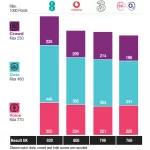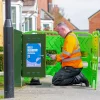Broadcast Lag in Live Online TV Sport Streaming Frustrates Fans

A new Opinium survey of 2,000 UK adults, which was commissioned by Uswitch.com, has hit upon the well-known problem of broadcast lag with live internet video streaming. The study estimates that nearly 15 million people (28%) have had goals spoiled because the broadcast they were watching was lagging behind the live action.
The issue typically causes streamed content to display a few seconds behind the action itself, which in some cases can even stretch into the tens of seconds. As a result, somebody listening via the radio or watching the live action via a terrestrial digital TV channel will often see the event take place before those viewing a stream on broadband connected devices.
The problem itself is nothing new, as all internet-connected networks suffer delays to video streams for various different reasons. In some cases, this could simply be down to a slow broadband ISP or mobile connection, as well as the need for a video stream to buffer and cache itself for a few moments before it starts playing. The latency times of your home network and broadband ISP can also have a tiny impact, but nothing too significant.
Advertisement
However, one of the biggest sources for such delays will occur because the content has to be converted into digital video data for streaming and then decoded at the customers end. The amount of delay that such issues cause can vary between platforms and broadcast types, but even a handful of seconds is often enough to create some irritation. Likewise, even digital terrestrial TV will have some extra delay vs the now discontinued analogue signals.
Delay compared to live action for various broadcast types (Uswitch)
| Rank | Broadcast type | Average delay (seconds) |
| 1 | Analogue Radio | Near instantaneous |
| 2 | Digital Radio | Between 1 and 2 seconds |
| 3 | Satellite television | Between 0.9 seconds and 2.2 seconds |
| 4 | Digital terrestrial TV | More than 1 second |
| 5 | Cable television | About 5 seconds |
| 6 | Streaming | Between 10 and 45 seconds |
The survey then asked football fans whether they have had a goal spoiled due to the broadcast they were watching having a delay over the live action, which resulted in 9% saying “Yes” because they had received a goal alert on their phone before they saw the goal go in on the stream. Of the others who answered “Yes“, some 5% said they heard it on the road first, while 10% heard people celebrate it in the nearby pub first and 9% overheard their neighbours celebrating before they themselves saw it.
Delay problems by different broadcast types
Advertisement
| Broadcast type | Fans who have had a goal spoiled |
| Streaming on a smart TV | 47% |
| Terrestrial broadcast on a non-smart TV | 28% |
| Streaming on a computer | 24% |
| Streaming on a mobile phone/tablet over WiFi | 20% |
| Streaming on a mobile phone/tablet over mobile signal | 18% |
| Reading web-based text service (eg BBC Sport live service) | 15% |
| Listening on digital radio | 17% |
| Receiving goal alerts on phone or computer | 16% |
| Listening on analogue radio | 12% |
Sadly, outside of the usual broadband and WiFi (router) upgrades, there’s not a lot that you can do to completely remove delays that occur in aspects of the network that sit outside your control. The best thing is to focus on the action and try to shut out any exterior sources that could give you forewarning, or maybe just listen on an old analogue radio.. won’t that be fun.
Modern technology is great, but it’s not perfect.
Mark is a professional technology writer, IT consultant and computer engineer from Dorset (England), he also founded ISPreview in 1999 and enjoys analysing the latest telecoms and broadband developments. Find me on X (Twitter), Mastodon, Facebook, BlueSky, Threads.net and Linkedin.
« Altice UK Acquires 12.1 Percent Equity Stage in BT Group























































Surely the rollout of FTTP will reduce this to the minimum possible amount. I thought BT had technology in the exchange/cabinets for this kind of thing?
No amount of FTTP or ISP equipment is going to solve the fact it takes time to transcode streams and that’s why there is a delay
@Gigabit. The delays you get from the broadband side are minimal, measured in the tens of milliseconds, so while that can contribute its impact will only ever be fairly limited.
Weren’t the BBC well on the way to solving this back in 2018? See https://www.bbc.co.uk/mediacentre/latestnews/2018/iplayer-lag and https://www.bbc.co.uk/rd/blog/2018-09-latency-video-streaming
I don’t think you can realistically have a situation of “no delay” in such services, there will always be some delay, although certainly they could have reduced it a fair bit. But of course not every platform will have done the same work.
Better (more predictable, not necessarily faster) networks would allow the player to keep a much smaller buffer which would go a long way to reducing this delay. The other challenge is in the CDN platforms.
Technically, transmission and encoding of IP video can be near instantaneous. We do it broadcast all the time. It just depends how you encode and distribute the signal. My guess would be that some of the delay is deliberate to help eliminate buffering issues.
These delays are more to with studio interception (foul language/subtitles), digital encoding, compression, encryption, security, caching and the level of resources used at each stage. Surely the answer is simply not to use multiple methods of broadcast at the same time.
I’m curious as to which of these you think aren’t an issue for Sky or Cable TV networks, and when you mention ‘caching’ do you mean ‘buffering’? The delay distributing to CDNs is minimal.
All digital TV has the features you mentioned, bar the encryption, and all the premium stuff is encrypted.
As Liam mentions a major issue is the unpredictability of Internet connectivity forcing buffering. It’s not even about changing bitrates – standard broadcast uses multiplexes of multiple streams pushed into a single carrier and makes extensive use of VBR but only on one side so no need to adapt to end users as all can either receive or not receive the stream.
If people are happy to tolerate pixellation, compression artifacts and dropped frames the delay can be removed.
Likewise, where an operator owns the network end-to-end or can guarantee resources across it streaming can be much improved. It’s fascinating just how much of our ‘broadcast’ TV on modern platforms is actually IPTV. A bunch of Virgin Media channels are IPTV, many premium services bundled with broadband, etc.
Tricky balancing act between adaptability to customer environments and delay. Customers trying to watch 1440p HDR on a tablet wirelessly via a router a few rooms away isn’t a factor ‘broadcast’ networks have to deal with thankfully. The more control of the end-to-end environment the provider loses the more they have to make allowances, the obvious one being loading up a buffer with multiple streams at varying bitrates as YouTube do.
I meant generically across technologies. I also meant no fault of the providers and their choices but rather to users to whom timing appears so critical to use more than one method.
It is what it is, live with it, anyone who’s seen VM video regarding their digital delivery network center, there is a huge amount of kit between the content supplier and the content consumer.
It will never be perfect.
Twitch (and YouTube with Ultra Low Latency enabled) can manage to get streaming broadcast delay down to about a second, so you’d think it would be possible for any other provider.
The main issue is people watching twitch are less likely to complain about buffering – although even that, Twitch offers a way to increase the buffer for connections which can’t handle low latency mode.
My assumption is that isn’t viable at scale, and with industrial H264 encoders, and for the sake of user experience, buffers are deliberately set high to try and prevent buffering on poor wifi. NowTV for example lowers the buffer if you’re using a box, but increases it for mobile and iPad streaming as they expect less reliable networks there.
Satellite broadcast delay (at least with Sky) for live sport is actually around 7 seconds. (You can tell that by watching something like F1, which starts the formation lap precisely on the hour, to the second)
Or a news channel with a clock on the screen…
I’ve noticed it when watching Sky Sports on Now and a friend is watching on Sky and they will text me sometimes about accidents or things happening and i will get the text just as it happens for me on my TV.
Nice easy way to check the time difference is to go to a betting website and select in-play.
It will show the clock time of the match as close as possible to live.
I find the delay can be 30-60s on some broadcasts by Sky/BT so usually by the time an app notification comes up I’ve seen it on screen.
What i found ruined things was when watching my football club via the club’s streaming TV channel. It had a bigger delay than the likes of the big two broadcasters. I’d get an app notification about goals/halftime sometimes 2mins before it came up on screen.
Is this really as big an issue as its made out to be?
Sport fans are a cash cow market segment and in return get treated very unfairly(multiple subscriptions/higher costs yr on yr) for what they pay.
Surely if you are enjoying the game as a purist you would want to silence notifications(goal alerts) close some windows(neighbours).
Or I dont know, expect better treatment from the powers that are controlling your game.
Glad I grew out of tribal sports. 2 cents
I think the problem is they are watching sports sober, how can you fully enjoy bread and circuses without a pint?
From my experience, online streaming delays a match between 30 seconds to 2 minutes compared to TV broadcast as well as flashscore.com.
I was watching the Champions League Final on BT Sport and when Chelsea scored the crowd outside my flat were celebrating around 30 seconds later after the goal. Since most likely they were watching on live streaming.
A few years ago I was watching a Trump rally speech on a Facebook live stream and ironically, it was identical to that on TV!! I was very surprised.
There also seems to be very little delay when the online video calling happens with Skype or Facebook. But unfortunately in sporting streams, there has been little progress last decade or so.
Similarly I also watch professional chess tournaments of Grand Masters via youtube/twitch when the same games are on lichess.org or chess.com and the delay is much smaller like 2 seconds compared to the live chess in game.
Years ago I would watch football live for free on streaming services like TvAnts. I gave up that idea, it’s simply not worth it. Better to pay TV subscription to Sky Sports or BT Sport than watch a low quality online stream broadcast.
The only aspect FTTP will solve, is the buffering/ intermittent freezing and broadcast resolution quality. But until the broadcast delay isn’t rectified, Full Fibre cannot replace our aerial/satellite TV!
One thing you completely missed out is many will use digital content protection plus geolocation protection which add additional seconds on both sides of the pipe.
Also when you encode and how you encode at base also matters. BT sports takes around 90s (fun watching motogp) Where as f1 is alot quicker.